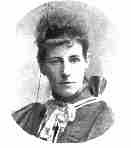Alice Oldham
Alice Oldham | |
|---|---|
 | |
| Born | 1850 |
| Died | 1907 Dublin, Ireland |
| Spouse | Unmarried |
| Children | None |
Alice Oldham (1850–1907) was one of the Nine Graces, the first nine women to graduate from University with a degree in either Great Britain or Ireland.[1] Oldham was a leader of the campaign for higher education of women in Ireland and in particular of the campaign to gain admission for women to Trinity College, Dublin.[2][3][4]
Biography
Oldham was born in Dublin in 1850, to Eldred Oldham, a Dublin linen draper and his wife Anne. Her brother was Charles Hubert Oldham, the first professor of National Economics at University College Dublin. Her sister Edith was a founder member of the Feis Ceoil, Dublin 1896. She was educated at Alexandra College. From 1886 she worked as a teacher there in a wide range of subjects including English, History, Logic, Ethics, Latin and Botany. She graduated from the Royal University of Ireland with a BA in 1884.[5][6]
Oldham was a member of the Dublin Women’s Suffrage movement. Passionate about women's right to equal education, she went with Mrs Byers of Victoria College to London to ensure girls’ schools were included in the Intermediate Education Act. In 1882 she was involved in the founding of the Central Association of Irish School mistresses to support education for girls and to ensure access to university, hence her resolve in the fight for admission to Trinity College, Dublin.[7][8] Provost Salmon was opposed to such a suggestion.
‘Over my dead body will women enter the College.’
In 1902, she became the first president of the newly formed Irish Association of Women Graduates who worked to achieve coeducation in higher education in Ireland. She was a regular contributor to the monthly The Journal of Education, published in London. She died in 1907. Her obituary in The Journal of Education, February 1907:
"Miss Oldham was widely known and greatly esteemed in Ireland. An effective advocate of the claims of women in all walks of life, she will be deservedly remembered for the splendid work which she rendered to the higher education of women."
In 1904 Trinity College, Dublin finally admitted women to the University and that year awarded Honorary Degrees to three leading Irish women, Isabella Mulvany, President of the Irish Association of Women Graduates, Sophie Bryant, principal of North London Collegiate School, Jane Barlow, novelist and author of Irish Idylls.[9] Despite her perseverance in getting women admitted to Trinity and the fact of her having achieved a University degree, Oldham was not included in this. Ironically, women were admitted to Trinity just after the death of Provost George Salmon.[10]
Published in 1909 was a book entitled An Introduction to the study of Philosophy which came from a series of her lectures on Philosophy.[11]
Alice Oldham Memorial Prize
Founded, by subscription, in 1908 in memory of Oldham it is awarded biennially in even years to the student judged to be the most distinguished of the women students and who attended Alexandra College.[12]
Other reading
- The Field Day Anthology of Irish Writing, Volume 5, Angela Bourke, NYU Press, 2002
- Vivid Faces: The Revolutionary Generation in Ireland, 1890-1923, R F Foster, Penguin UK, 2 Oct 2014
- The Admission of Women to the National University of Ireland, Judith Harford, Education Research and Perspectives, Vol. 35, No.2, 2008
References
- ^ Professor Brendan Walsh (2014). Knowing Their Place: The Intellectual Life of Women in the 19th Century. The History Press.
- ^ "Dictionary of Irish Biography".
- ^ "Women;s Centenary".
- ^ "Oxford Dictionary of National Biography".
- ^ Susan M. Parkes, FTCD. "Alice Oldham and the admission of women to Trinity College, 1892-1904" (PDF).
- ^ "Women;s Centenary".
- ^ Maria Luddy (1995). Women in Ireland, 1800-1918: A Documentary History. Cork University Press.
- ^ "Women;s Centenary".
- ^ "Women in Trinity College".
- ^ Royal Irish Academy, Dictionary of Irish Biography – George Salmon by Roderick Gow
- ^ Maria Luddy (1995). Women in Ireland, 1800-1918: A Documentary History. Cork University Press. p. 356.
- ^ "Trinity Prizes".
